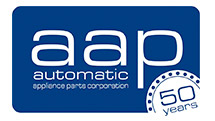Easy Maintenance Tips For Home Appliance Care
You Are Here: Home > Automatic Appliance Parts Blog > Easy Maintenance Tips For Home Appliance Care
*** Please be aware that Norridge is the only shipping facility. Inventory on-hand at all other branches is unavailable for immediate shipment. ***
Home appliances are often the unsung heroes of our daily lives because no matter how much time and energy they save us, we tend to never think about them until they fail to run properly. When this happens, it's usually best that you call a professional to repair them. However, that moment can be delayed for many years by following some basic home maintenance tips.
Stoves and Ovens
Gas and electric ovens and stoves generally work perfectly fine for many years, as long as you keep them clean and free of any food buildup. Small drops of food and grease tend to accumulate and harden near the electric coils or gas burners and become hard to remove after a while, so it's best to clean them regularly and as often as you can. Usually, all you need are some paper towels and glass or stovetop cleaner, but you may also need a toothbrush for those hard-to-remove pieces of debris.
The same goes for the oven, as most of the food buildup can be removed with a specialty cleaner and some paper towels. Some ovens make things even easier for you by having a self-cleaning function that heats them up to a point where any food remains are burned off. Cleaning the vent hood also helps, making it more efficient in removing steam, smoke, and odors.
Refrigerators and Freezers
The refrigerator is arguably the home appliance that's most often taken for granted, as most users just plug it in and expect it to run forever. This is especially true for newer models, which automatically remove the excess frost from time to time. While fridges can indeed last a long time with minimum upkeep, neglecting them significantly increases the odds of them failing. Luckily, basic fridge maintenance is a pretty simple operation and can be done while you're cleaning and vacuuming the rest of the house.
The fridge's main component is its compressor coils, which are placed at the back of the unit and have the role of taking out the heat from inside the unit. Over time, the coils tend to get clogged with dust, dirt, and animal hair, making them less efficient and more likely to fail. Simply running the vacuum cleaner over them from time to time will keep them clean and running at optimum efficiency. You should also clean the gaskets on the fridge door to make sure they seal it completely, keeping all the cool air inside.
Dishwashers
As with any other home appliance, keeping a dishwasher in top condition for a long time is mainly a matter of keeping it clean. Although they do a very good job of keeping themselves clean, they need a little help from you when it comes to their filter system. Most dishwashers use filters to catch food particles during the washing cycle, which in time tend to get clogged with pieces of bone, seeds, and other types of hard debris. Luckily, they are easy to remove and to wash, as simply placing them under running water will clean them well.
Another common issue for dishwashers is that, over time, small mineral deposits found in water tend to clog the small water holes used by the dishwasher to spray water onto the dishes. You can easily clean the holes by using a toothpick and this should be done about twice a year.
Washing Machines
Washing machines usually require little maintenance and run flawlessly for many years, but there are still small things you can do to keep them in top condition. First of all, the best thing you can do for your washing machine is simply to leave its door open after using it. The high humidity inside the machine can lead to mildew and mold, making your clothes smell less fresh and possibly affecting your health. By letting the airflow through the washer, the excess moisture will evaporate.
Although washing machines rarely break down, a leaky water hose can cause much damage to the rest of the house by flooding it. You should check the hose at least once every few months for any signs of wear and tear, such as small cracks, bumps, and any other types of deformities. Buying a new hose is relatively inexpensive and may save you thousands of dollars in damages caused by water leaks.
Should I Fix It Myself or Call a Professional?
Regularly cleaning and maintaining your home appliances will make them work perfectly for many years, but eventually, some repair work will be needed. Although there are some easy DIY repairs for appliances that only call for appliance replacement parts, such as changing the washing machine hose, replacing filters, and other similar jobs, most repair work should be done by professionals. Although saving some money by attempting to fix them yourself may be tempting, there's always a chance that you will end up causing even more damage and will end up paying way more than you would have by simply calling a specialist.
Fixing home appliances by yourself can also prove to be a health hazard for you and everyone else in your household. Stoves can leak gas, fridges can leak refrigerant, washing machines can leak water, and the list goes on. Any of these substances can be of great danger for both your home and the people inside it. The bottom line is that performing minor repairs on your appliances is inexpensive and can be done with the help of appliance repair guides. However, anything more complicated than changing a basic component should be left to professionals.
Home appliances have quietly revolutionized the world by offering us cleaner clothes, better food, and much more free time. They require little upkeep and will usually run just fine for many years, making our lives better in the process. All they ask in return is that we remember them from time to time and make sure they are clean and well-maintained. Now that you know how to do it, it's time that you go and show your home appliances a little love.

 Shopping Cart [empty]
Shopping Cart [empty]








